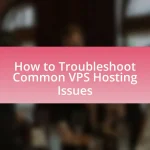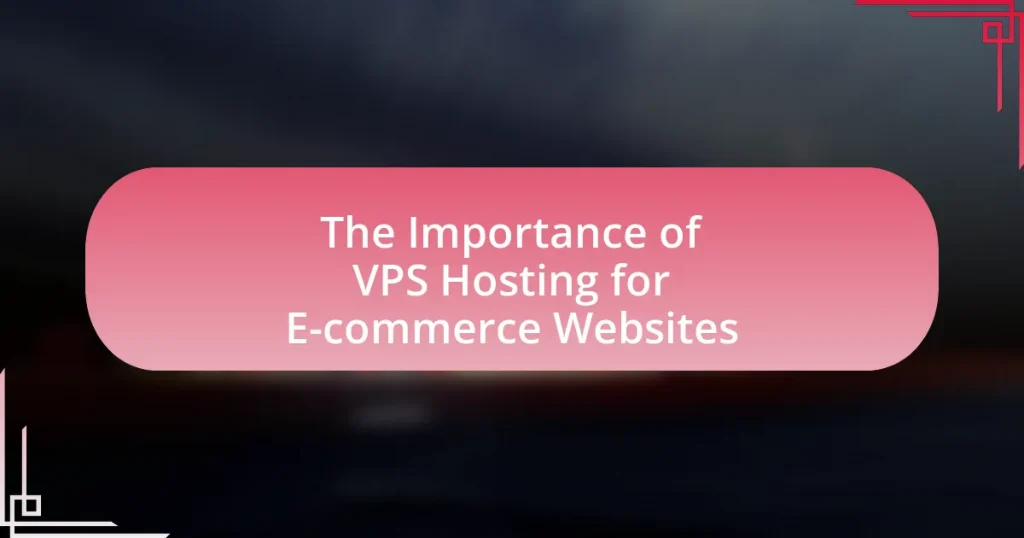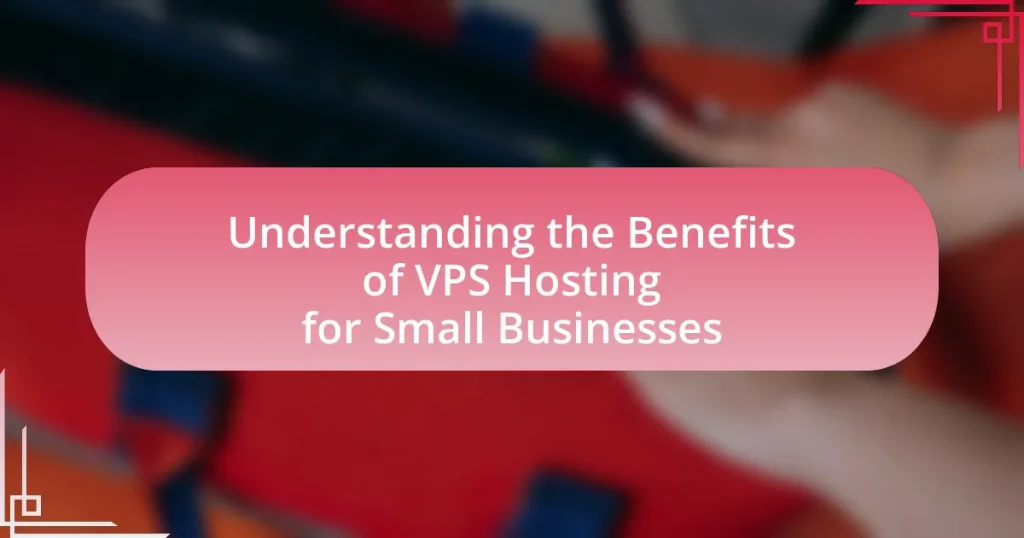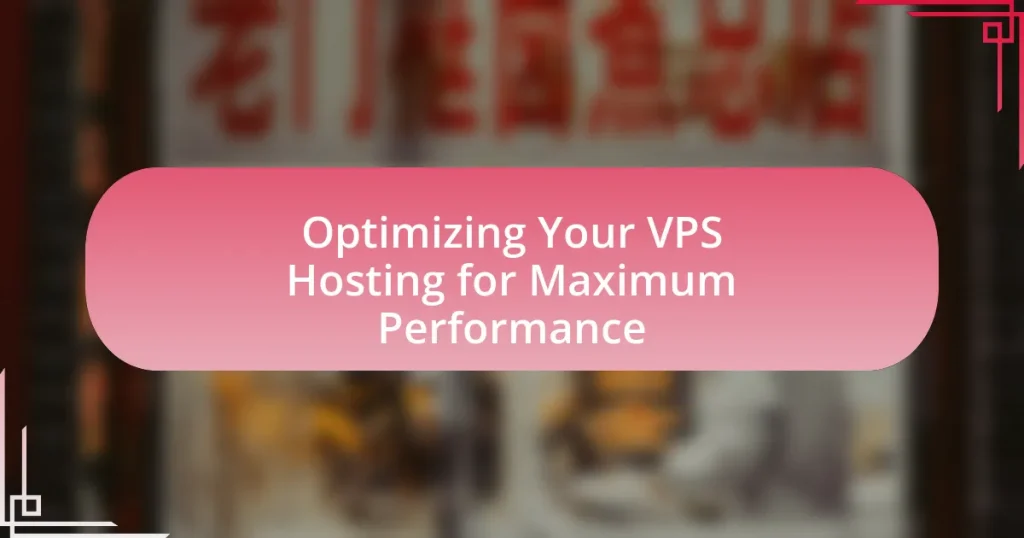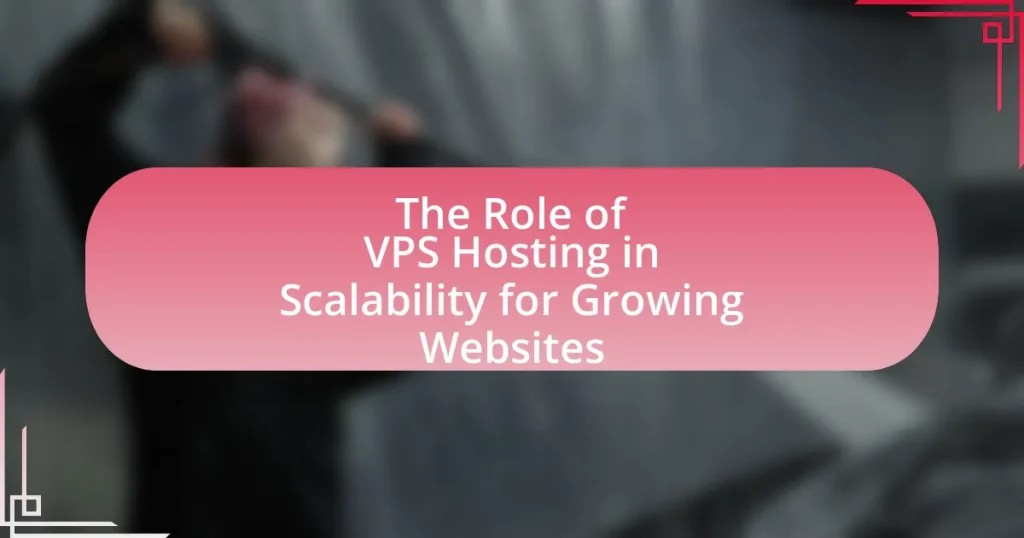VPS hosting, or Virtual Private Server hosting, is a crucial web hosting solution for e-commerce websites, offering dedicated resources that enhance performance, security, and scalability compared to shared hosting. This article outlines the differences between VPS, shared, and dedicated hosting, emphasizing the importance of VPS for maintaining website reliability and speed, which are vital for customer satisfaction and conversion rates. Key features of VPS hosting, such as enhanced security measures and the ability to accommodate traffic spikes, are discussed, along with the long-term benefits of scalability and effective resource management. Additionally, the article addresses common challenges faced by e-commerce sites without VPS hosting and provides best practices for selecting a VPS provider to optimize performance and security.
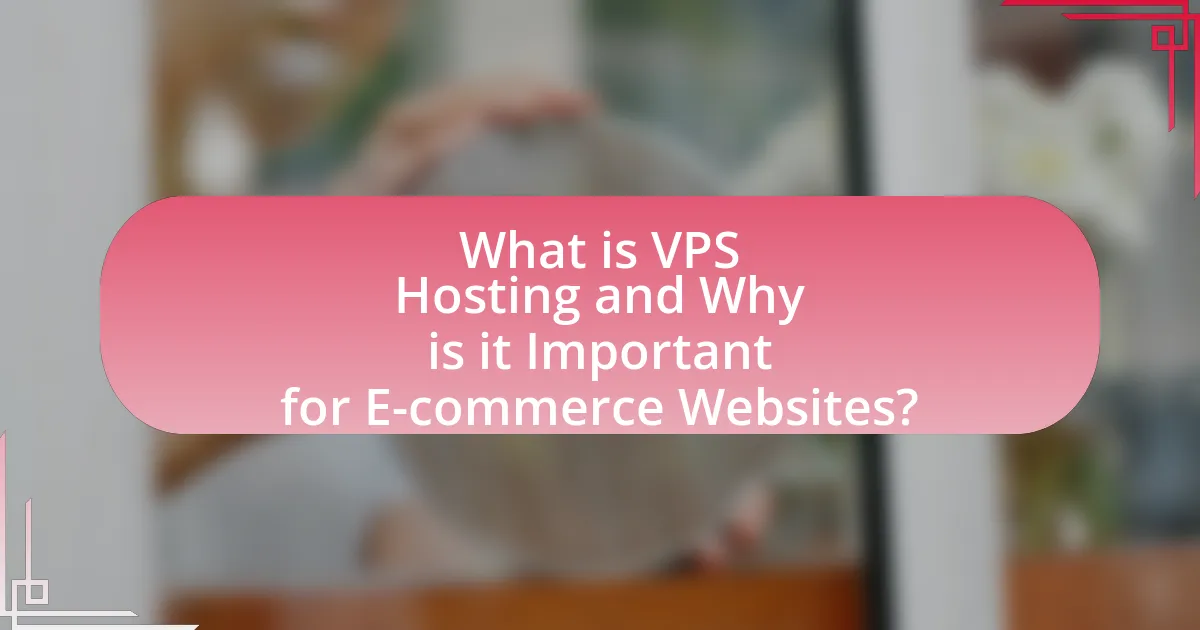
What is VPS Hosting and Why is it Important for E-commerce Websites?
VPS hosting, or Virtual Private Server hosting, is a type of web hosting that provides dedicated resources on a virtual server, allowing for greater control, customization, and performance compared to shared hosting. It is important for e-commerce websites because it ensures higher reliability, faster loading times, and enhanced security, which are critical for maintaining customer trust and satisfaction. According to a study by Akamai, a 100-millisecond delay in website load time can decrease conversion rates by 7%. This highlights the necessity of VPS hosting for e-commerce platforms that require optimal performance to drive sales and improve user experience.
How does VPS Hosting differ from shared and dedicated hosting?
VPS hosting differs from shared and dedicated hosting primarily in resource allocation and performance. In VPS hosting, a physical server is divided into multiple virtual servers, each with its own dedicated resources, allowing for better performance and stability compared to shared hosting, where resources are shared among multiple users. Conversely, dedicated hosting provides an entire physical server exclusively for one user, offering maximum control and performance but at a higher cost. VPS hosting strikes a balance between the affordability of shared hosting and the performance of dedicated hosting, making it ideal for e-commerce websites that require reliable uptime and scalability.
What are the key features of VPS Hosting that benefit e-commerce?
VPS Hosting offers several key features that significantly benefit e-commerce, including dedicated resources, enhanced security, and scalability. Dedicated resources ensure that e-commerce websites have consistent performance, as they are not affected by the activities of other users, which is crucial during high-traffic periods like sales events. Enhanced security features, such as isolated environments and customizable firewalls, protect sensitive customer data and transactions, reducing the risk of breaches. Scalability allows e-commerce businesses to easily adjust their resources based on traffic demands, ensuring optimal performance without downtime. These features collectively contribute to a reliable and secure online shopping experience, which is essential for customer satisfaction and retention.
Why might an e-commerce site choose VPS over other hosting options?
An e-commerce site might choose VPS hosting over other options due to its balance of performance, control, and cost-effectiveness. VPS provides dedicated resources, which enhances website speed and reliability, crucial for maintaining customer satisfaction and reducing bounce rates. According to a study by Google, a one-second delay in page load time can lead to a 20% decrease in conversions, highlighting the importance of optimal performance. Additionally, VPS allows for greater customization and security compared to shared hosting, enabling e-commerce sites to implement specific software and security measures tailored to their needs. This level of control is essential for handling sensitive customer data and complying with regulations like PCI DSS.
What are the primary advantages of using VPS Hosting for e-commerce?
The primary advantages of using VPS Hosting for e-commerce include enhanced performance, improved security, and greater control over server resources. Enhanced performance is achieved through dedicated resources, which ensures faster loading times and better handling of traffic spikes, crucial for maintaining customer satisfaction and reducing cart abandonment rates. Improved security is provided by isolated environments that protect sensitive customer data and transactions, reducing the risk of breaches compared to shared hosting. Greater control allows e-commerce businesses to customize server configurations and install necessary software, enabling tailored solutions that meet specific operational needs. These advantages collectively contribute to a more reliable and efficient e-commerce platform.
How does VPS Hosting enhance website performance and speed?
VPS hosting enhances website performance and speed by providing dedicated resources that are not shared with other users. This isolation allows for faster data processing and reduced latency, resulting in quicker load times for websites. According to a study by Google, a one-second delay in page load time can lead to a 20% decrease in conversions, highlighting the critical role of speed in e-commerce. Additionally, VPS hosting offers scalability, enabling websites to handle increased traffic without compromising performance, which is essential for e-commerce platforms during peak shopping periods.
In what ways does VPS Hosting improve security for e-commerce transactions?
VPS Hosting improves security for e-commerce transactions by providing dedicated resources and enhanced isolation from other users. This isolation minimizes the risk of data breaches, as each VPS operates independently, reducing the likelihood of cross-contamination from neighboring accounts. Additionally, VPS Hosting allows for the implementation of advanced security measures such as firewalls, intrusion detection systems, and SSL certificates, which encrypt sensitive customer data during transactions. According to a study by the Ponemon Institute, organizations that utilize dedicated hosting solutions, like VPS, experience 30% fewer security incidents compared to shared hosting environments. This demonstrates that VPS Hosting significantly enhances the security posture of e-commerce platforms, safeguarding customer information and fostering trust.
What challenges do e-commerce websites face without VPS Hosting?
E-commerce websites face significant challenges without VPS Hosting, primarily including limited performance, security vulnerabilities, and scalability issues. Without VPS Hosting, these websites often experience slower loading times due to shared resources, which can lead to higher bounce rates; studies show that a one-second delay in page load time can reduce conversions by 7%. Additionally, shared hosting environments expose e-commerce sites to greater security risks, as vulnerabilities in one site can compromise others on the same server. Furthermore, without the ability to scale resources quickly, e-commerce websites may struggle to handle traffic spikes during peak shopping seasons, resulting in potential revenue loss. These factors collectively hinder the overall user experience and operational efficiency of e-commerce platforms.
How can downtime affect an e-commerce business?
Downtime can severely impact an e-commerce business by leading to lost sales, decreased customer trust, and potential long-term damage to brand reputation. When an online store experiences downtime, customers are unable to access products or complete purchases, resulting in immediate revenue loss; for instance, a study by the Aberdeen Group found that a single hour of downtime can cost an e-commerce business up to $100,000. Additionally, frequent outages can frustrate customers, causing them to seek alternatives, which diminishes customer loyalty and trust. Over time, this can lead to a decline in market share and a negative perception of the brand, making it crucial for e-commerce businesses to invest in reliable hosting solutions, such as VPS hosting, to minimize downtime and maintain operational continuity.
What security risks are associated with shared hosting for e-commerce?
Shared hosting for e-commerce presents several security risks, primarily due to the lack of isolation between different users on the same server. This environment increases vulnerability to attacks such as cross-site scripting (XSS), where malicious scripts can be injected into websites, and cross-site request forgery (CSRF), which can lead to unauthorized actions on behalf of users. Additionally, if one website on a shared server is compromised, it can potentially expose sensitive data from other sites, including customer information and payment details. According to a report by the Ponemon Institute, 60% of small businesses that experience a cyber attack go out of business within six months, highlighting the critical nature of these risks for e-commerce operations.
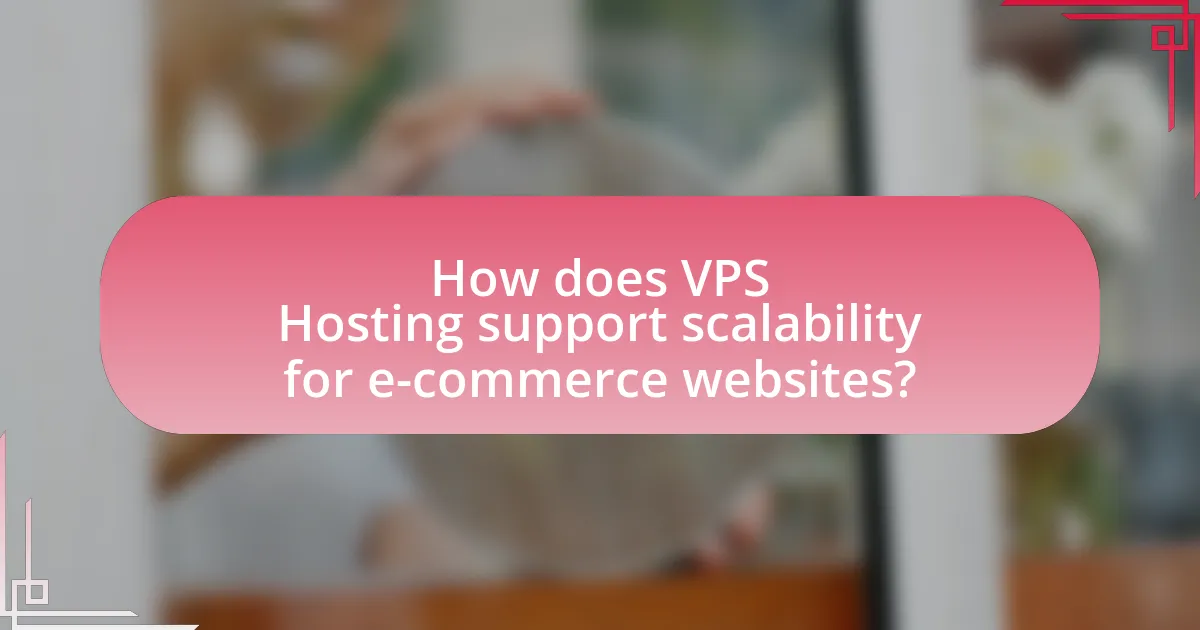
How does VPS Hosting support scalability for e-commerce websites?
VPS hosting supports scalability for e-commerce websites by providing dedicated resources that can be easily adjusted based on traffic demands. This flexibility allows e-commerce businesses to upgrade their CPU, RAM, and storage without significant downtime, accommodating fluctuating visitor numbers during peak shopping seasons or promotional events. According to a study by HostingAdvice, 70% of e-commerce sites experience increased traffic during holidays, making the ability to scale resources crucial for maintaining performance and user experience.
What does scalability mean in the context of e-commerce hosting?
Scalability in the context of e-commerce hosting refers to the ability of a hosting solution to efficiently handle increasing amounts of traffic and data as a business grows. This means that as an e-commerce website experiences fluctuations in user demand, such as during peak shopping seasons, the hosting infrastructure can expand resources like bandwidth, storage, and processing power without significant downtime or performance degradation. For instance, a VPS hosting environment allows for dynamic resource allocation, enabling businesses to scale up or down based on real-time needs, which is crucial for maintaining optimal user experience and operational efficiency.
How can VPS Hosting accommodate traffic spikes during sales events?
VPS hosting can accommodate traffic spikes during sales events by providing dedicated resources that can be scaled according to demand. This means that during high-traffic periods, such as sales events, a VPS can allocate additional CPU, RAM, and bandwidth to handle increased visitor loads without compromising performance. For instance, VPS hosting allows for vertical scaling, where resources can be upgraded in real-time, ensuring that the website remains responsive and stable even under heavy traffic. Additionally, VPS environments often include load balancing features, which distribute incoming traffic across multiple servers, further enhancing the ability to manage sudden surges in user activity effectively.
What are the long-term benefits of scalable VPS solutions for growing businesses?
Scalable VPS solutions provide long-term benefits for growing businesses by offering flexibility, cost-efficiency, and enhanced performance. As businesses expand, scalable VPS allows them to adjust resources such as CPU, RAM, and storage without significant downtime or migration challenges. This adaptability ensures that businesses can meet increasing traffic demands and resource needs efficiently.
Moreover, according to a study by HostingAdvice, 70% of businesses reported improved performance and reliability after switching to VPS hosting, highlighting the importance of resource allocation in maintaining optimal website functionality. Additionally, scalable VPS solutions often come with managed services, which can reduce operational costs and allow businesses to focus on growth rather than IT management. This combination of flexibility, performance, and cost-effectiveness makes scalable VPS a strategic choice for long-term business success.
How does VPS Hosting facilitate better resource management for e-commerce?
VPS Hosting facilitates better resource management for e-commerce by providing dedicated resources that enhance performance and scalability. Unlike shared hosting, where resources are limited and can be affected by other users, VPS Hosting allocates specific amounts of CPU, RAM, and storage to each virtual server. This ensures that e-commerce websites can handle higher traffic volumes and process transactions efficiently without slowdowns. Additionally, VPS Hosting allows for easy upgrades to resources as business needs grow, enabling e-commerce platforms to adapt quickly to changing demands. This adaptability is crucial, as studies show that 47% of consumers expect a web page to load in two seconds or less, and any delay can lead to lost sales.
What resources can be allocated more effectively with VPS Hosting?
VPS Hosting allows for more effective allocation of CPU, RAM, and storage resources. With VPS, each virtual server operates independently, enabling dedicated resources that enhance performance and reliability. This independence ensures that e-commerce websites can handle higher traffic volumes without slowdowns, as resources are not shared with other users. Additionally, VPS Hosting provides scalability, allowing businesses to adjust their resource allocation based on demand, which is crucial for managing peak shopping periods.
How does resource management impact user experience on e-commerce sites?
Resource management significantly impacts user experience on e-commerce sites by ensuring optimal performance and reliability. Effective resource management, such as allocating sufficient bandwidth and server capacity, leads to faster loading times and reduced downtime, which are critical for retaining customers. According to a study by Google, a one-second delay in page load time can result in a 20% decrease in conversion rates. Therefore, proper resource management directly correlates with improved user satisfaction and increased sales on e-commerce platforms.
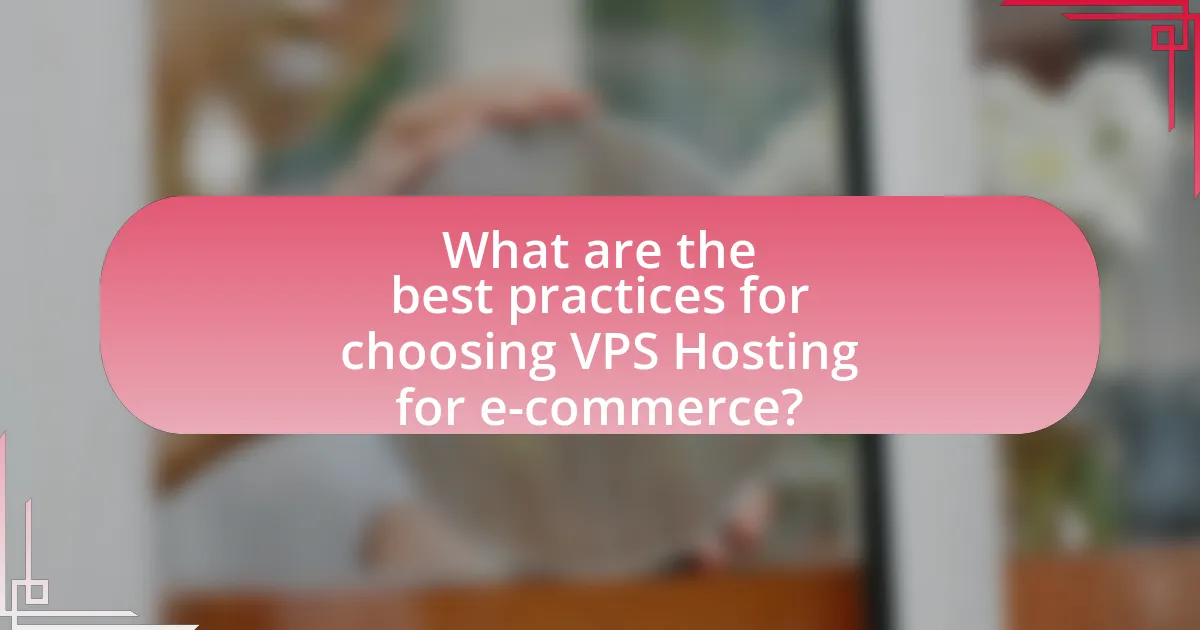
What are the best practices for choosing VPS Hosting for e-commerce?
The best practices for choosing VPS Hosting for e-commerce include assessing performance, ensuring scalability, evaluating security features, and considering customer support. Performance is critical; a VPS should provide sufficient resources like CPU, RAM, and SSD storage to handle traffic spikes and ensure fast loading times, which can directly impact conversion rates. Scalability is essential for e-commerce growth; the hosting solution should allow easy upgrades to accommodate increasing traffic and resource demands. Security features, such as DDoS protection, SSL certificates, and regular backups, are vital to protect sensitive customer data and maintain trust. Lastly, reliable customer support is necessary to resolve issues quickly, as downtime can lead to lost sales. According to a study by Google, 53% of mobile users abandon sites that take longer than three seconds to load, highlighting the importance of performance in VPS hosting for e-commerce.
What factors should be considered when selecting a VPS Hosting provider?
When selecting a VPS hosting provider, key factors to consider include performance, reliability, scalability, support, and pricing. Performance is crucial as it affects website speed and user experience; providers should offer SSD storage and high bandwidth. Reliability is essential, with uptime guarantees of at least 99.9% being standard in the industry, ensuring that e-commerce websites remain accessible. Scalability allows businesses to adjust resources as they grow, which is vital for handling traffic spikes during sales or promotions. Support should be available 24/7 through multiple channels, as prompt assistance can resolve issues quickly. Lastly, pricing should be transparent, with no hidden fees, and should align with the features offered, ensuring that businesses receive good value for their investment.
How important is customer support in VPS Hosting for e-commerce?
Customer support is crucial in VPS hosting for e-commerce as it directly impacts website performance and customer satisfaction. E-commerce businesses rely on their online presence for sales, and any downtime or technical issues can lead to lost revenue and customer trust. According to a study by Zendesk, 82% of consumers have stopped doing business with a company due to poor customer service. Therefore, responsive and knowledgeable customer support in VPS hosting ensures that e-commerce platforms can quickly resolve issues, maintain uptime, and provide a seamless shopping experience for customers.
What role does uptime guarantee play in choosing a VPS provider?
Uptime guarantee is critical in selecting a VPS provider because it directly impacts the reliability and availability of e-commerce websites. A high uptime guarantee, typically 99.9% or higher, ensures that the website remains accessible to customers, which is essential for maintaining sales and customer trust. For instance, a study by the Aberdeen Group found that a 1% increase in website downtime can lead to a 7% loss in conversions. Therefore, choosing a VPS provider with a strong uptime guarantee minimizes the risk of downtime, thereby enhancing the overall performance and credibility of an e-commerce platform.
What are common pitfalls to avoid when using VPS Hosting for e-commerce?
Common pitfalls to avoid when using VPS Hosting for e-commerce include inadequate resource allocation, neglecting security measures, and failing to optimize performance. Inadequate resource allocation can lead to slow loading times and downtime, negatively impacting user experience and sales. Neglecting security measures, such as not implementing firewalls or SSL certificates, can expose sensitive customer data to breaches, resulting in loss of trust and potential legal issues. Failing to optimize performance, including not regularly updating software or misconfiguring server settings, can hinder site speed and responsiveness, which are critical for retaining customers. These pitfalls can significantly affect the success of an e-commerce business, making it essential to address them proactively.
How can misconfiguration lead to security vulnerabilities?
Misconfiguration can lead to security vulnerabilities by creating unintended access points or weaknesses in a system’s defenses. For instance, improperly set permissions on files or directories can allow unauthorized users to access sensitive data, as evidenced by the 2019 Capital One breach, where a misconfigured firewall allowed an attacker to exploit a vulnerability and access over 100 million customer records. Additionally, default settings in software can expose systems to known exploits, highlighting the critical need for proper configuration management in securing e-commerce platforms.
What are the consequences of neglecting regular maintenance on VPS?
Neglecting regular maintenance on a Virtual Private Server (VPS) can lead to significant performance degradation, security vulnerabilities, and potential data loss. Without routine updates and monitoring, software may become outdated, exposing the server to exploits and malware attacks. For instance, a study by the Ponemon Institute found that 60% of small businesses that experience a cyber attack go out of business within six months, highlighting the critical nature of maintaining security protocols. Additionally, failure to manage resources effectively can result in slow response times and downtime, which directly impacts user experience and can lead to lost revenue for e-commerce websites. Regular maintenance is essential to ensure optimal performance, security, and reliability of VPS hosting.
What practical tips can enhance the effectiveness of VPS Hosting for e-commerce?
To enhance the effectiveness of VPS Hosting for e-commerce, businesses should prioritize resource allocation, security measures, and performance optimization. Allocating sufficient CPU, RAM, and storage resources ensures that the e-commerce platform can handle high traffic volumes, especially during peak shopping seasons, which is crucial as studies show that 79% of online shoppers who experience performance issues are less likely to return. Implementing robust security measures, such as firewalls and regular software updates, protects sensitive customer data, which is vital given that 43% of cyber attacks target small businesses. Additionally, optimizing website performance through content delivery networks (CDNs) and caching solutions can significantly reduce load times, improving user experience and conversion rates, as a one-second delay in page load time can lead to a 7% reduction in conversions.
How can regular backups improve e-commerce site reliability?
Regular backups enhance e-commerce site reliability by ensuring data integrity and availability in case of system failures or cyberattacks. When an e-commerce platform experiences issues such as data corruption or loss due to unforeseen events, having recent backups allows for quick restoration of the site to its last stable state. According to a study by the Ponemon Institute, 70% of businesses that experience significant data loss go out of business within a year, highlighting the critical nature of backups. Furthermore, regular backups facilitate compliance with data protection regulations, which can prevent legal issues and maintain customer trust.
What monitoring tools can help optimize VPS performance for e-commerce?
Monitoring tools that can help optimize VPS performance for e-commerce include New Relic, Datadog, and Nagios. New Relic provides real-time performance monitoring and analytics, enabling e-commerce sites to track application performance and user interactions, which can lead to improved load times and user experience. Datadog offers comprehensive monitoring across servers, databases, and applications, allowing for proactive identification of performance bottlenecks. Nagios is an open-source tool that monitors system metrics and alerts users to potential issues, ensuring that e-commerce platforms maintain optimal uptime and performance. These tools collectively enhance the reliability and efficiency of VPS hosting for e-commerce websites.






